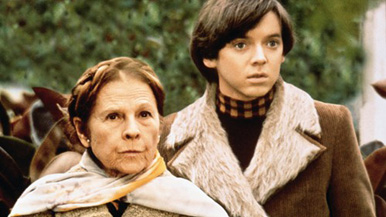|
|
Viking Night: Harold and MaudeBy Bruce HallJuly 7, 2015
Her response is to send him to a daffy head shrink, marry him off, or recruit him into the Army. At dinner, she consistently speaks about him in the third person as though he’s an old car that won’t quite run right but has just enough sentimental value to keep around. Speaking of old cars, Harold’s hobbies include driving a hearse to funerals and watching complete strangers weep over their dearly departed. Combine that with Bud Cort’s ghostly pallor and wide eyed disillusionment, and this might be the world’s first Goth comedy. Harold’s repeated attempts at fake suicide are played for laughs - dry laughs - and his mother’s bullheaded insistence on not responding to it is equal parts hilarious and heartbreaking. One of my favorite scenes is the one where Harold’s mother signs him up for a computer dating service (which was apparently a thing in 1971), virtually ignoring his presence as she fills out the questionnaire with her own preferences. Meanwhile, her son calmly and deliberately shoots himself in the head with a prop gun. Yeah, that’s what you do with someone who’s savagely depressed - you force your will on them. It’s a high-level view of their relationship, and it makes me a little sad that dear mother doesn’t see what a bright future her child has in the movie special effects or Las Vegas based magician industries.
|

|
|
|

|
Friday, November 1, 2024
© 2024 Box Office Prophets, a division of One Of Us, Inc.


